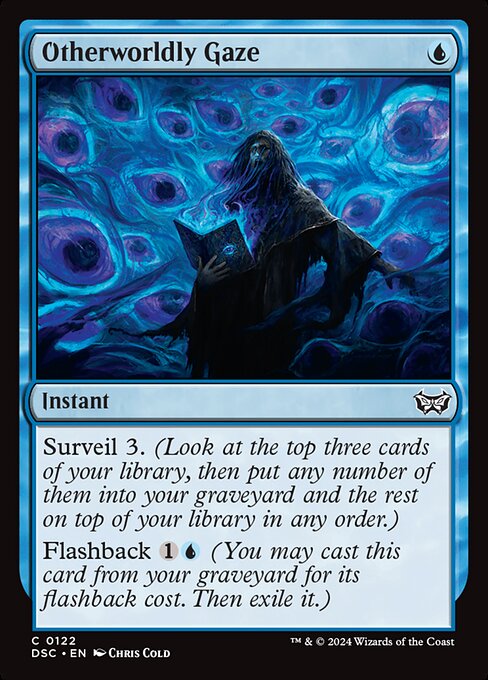
Image courtesy of Scryfall.com
Blue in Commander is often an exercise in balancing elegant efficiency with mental gymnastics, and a single-for-one moment of clarity can tilt an entire game. Otherworldly Gaze arrives as a tiny-but-mighty tool, costing just one blue mana and delivering a big cognitive payoff: Surveil 3 paired with a flashback option. For players who love the delicate choreography of topdeck manipulation, hand shaping, and graveyard recursions, this instant slips into decks with the grace of a well-timed counterspell—yet it invites you to narrate your own thought process with every draw and decision 🧙♂️. In the Duskmourn: House of Horror Commander landscape, where the dim corridors of the library often hold as much power as a finisher, Gaze becomes a focal point for how we handle complexity without losing tempo.
Let’s unpack the card in practical terms. Surveil 3 lets you peek at the top three cards of your library, then pick any number of them to put into your graveyard and arrange the rest on top in any order. The act is deceptively simple on the surface, but it introduces a layer of micro-decisions: which cards deserve a one-way ticket to the graveyard this turn? Which should stay in the queue to shape future draws? And how does this filtering interact with your broader game plan—whether you’re edging toward a synergy-heavy graveyard deck, a volumetric control shell, or a milling-for-maximum-value strategy? The cognitive load isn’t about juggling ten things at once; it’s about balancing intention with information—that sweet spot where you feel confident in your next draw step and your next drop of blue mana 💎.
Then comes the encore: Flashback for {1}{U}. Casting Otherworldly Gaze from your graveyard lets you surveil again, treating your graveyard like a second library you can leverage. The payoff is double-edged: it gives you redundancy and opportunity, but it also doubles the mental map you must maintain. You’re not just asking, “What’s on top?” You’re asking, “What have I learned from the top three already, and how does that reshape my next three draws, both now and in the future?” The flashback cost nudges you to consider your graveyard as a resource, a concept-blue players treasure but must manage with care to avoid slipping into analysis paralysis. In Commander’s multi-player arena, that extra layer can be a powerful advantage or a source of fatigue if not tamed with mindful practice 🧭.
Design-wise, Otherworldly Gaze is a versatile piece for blue decks that want to stay lean while still delivering selection and recursion. Its set, Duskmourn: House of Horror Commander, leans into darker, cerebral themes—cards that reward thoughtful play and deck-building edges. Being a common rarity, it’s accessible enough to slot into budget builds or casual tables, but the mechanics reward players who lean into the planning aspect of Surveil and Flashback rather than pure raw speed. The card’s color identity (U) keeps your deck leaning into interaction, card selection, and graveyard tempo rather than heavy midrange or white-based stax tendencies. The art by Chris Cold and the 2015 frame evoke a mood that’s equal parts mystery and methodical discovery—perfect for a theme that cherishes mental map-making as a strategic asset 🎨.
From a cognitive-load perspective, there are several practical approaches to maximize benefit while minimizing fatigue. First, establish a predictable rhythm: plan a sequence for using Surveil early in your turns, note how many cards you expect to send to the graveyard, and keep a mental checklist of what you want to protect on top of your library. Second, pair Gaze with cards that reward or rely on graveyard manipulation, such as spells with synergies around flashback or delve-like effects, so that the act of surveilling is part of a larger, cohesive arc rather than a standalone mind puzzle. Third, create a simple memory cue for your decision points—perhaps a quick bench-mark like, “draw step: protect X cards, discard Y,” so you can keep your hands steady and your brain uncluttered while the table turns. And finally, embrace the social aspect: in multiplayer formats, your cognitive plan is visible to opponents only in as much as you choose. Clear communication about your intentions can help pace the game and reduce delays that compound mental strain 🧠⚡.
Enthusiasts who chase synergy often build around the idea that Surveil reduces randomness while adding the thrill of careful curation. Otherworldly Gaze embodies this balance: it is barely more than a coffee-priced spell in mana but carries the gravitational pull of a strategic hinge. If you’re wiring a deck that loves to sculpt the top of the library—whether to enable potent graveyard interactions, enable flashback-driven loops, or simply smooth out variance—this card becomes a dependable ally. And because it’s an instant, you can react, delay, or accelerate your plan as the board state shifts. That flexibility is gold in a format where parries and feints shape every game 🗺️.
To readers plotting their own blue-centric, top-deck-led builds, Otherworldly Gaze offers a compact toolkit with outsized intellectual payoff. It doesn’t demand heroic memory feats; it invites disciplined, narrative play. You’ll find yourself savoring the moment when you surveil into the exact card you need, then set up the top-of-library order to keep the run going—without breaking your mental flow. In the grand tapestry of Commander, where every card has a story and every turn could redefine the table, a little cognitive clarity goes a long way 🧙♂️💡.
Neoprene Mouse Pad Round Rectangular Non-Slip Colorful Desk Pad
More from our network
- https://crypto-acolytes.xyz/blog/post/hot-giant-at-28-kpc-tracing-spiral-arms-with-dr3/
- https://blog.digital-vault.xyz/blog/post/comparing-furnace-punishers-flavor-text-to-real-mythology/
- https://crypto-acolytes.xyz/blog/post/observing-a-hot-blue-star-toward-the-galactic-center/
- https://blog.digital-vault.xyz/blog/post/wall-of-wonder-foil-variants-and-print-scarcity-trends/
- https://crypto-acolytes.xyz/blog/post/blockchain-in-real-estate-redefining-transactions-and-ownership/